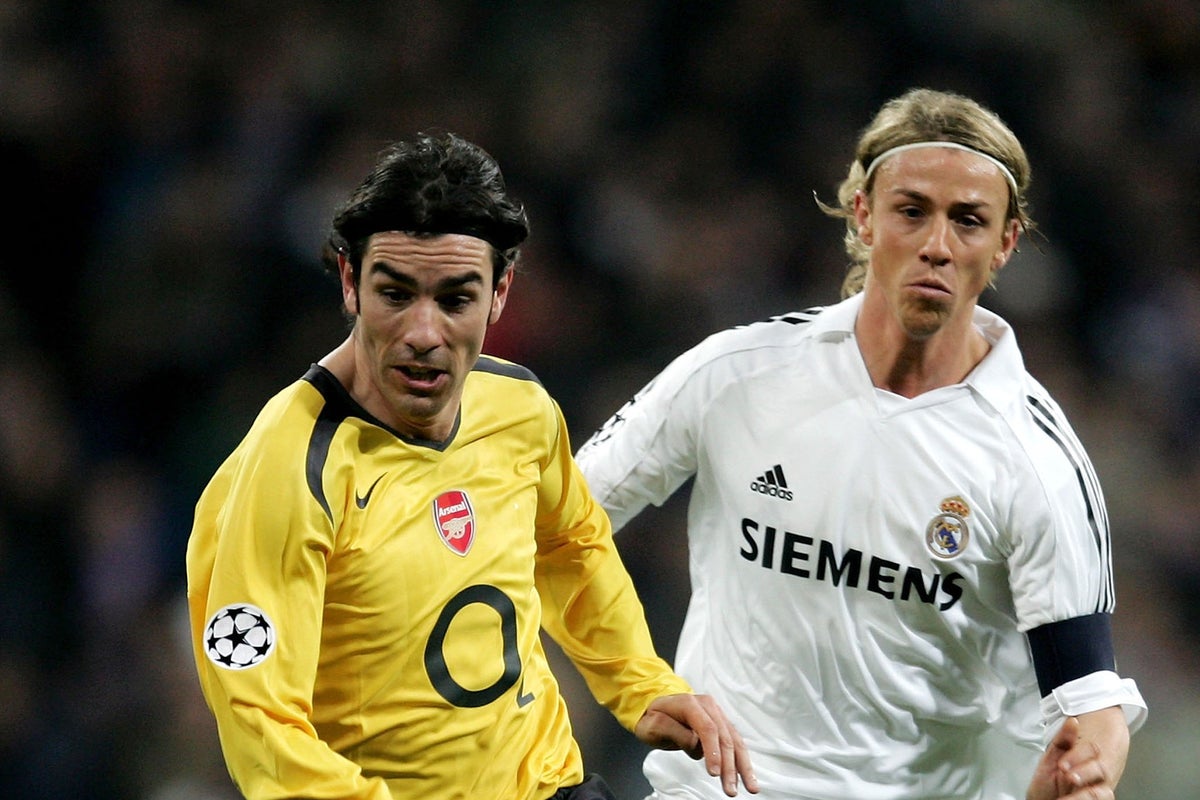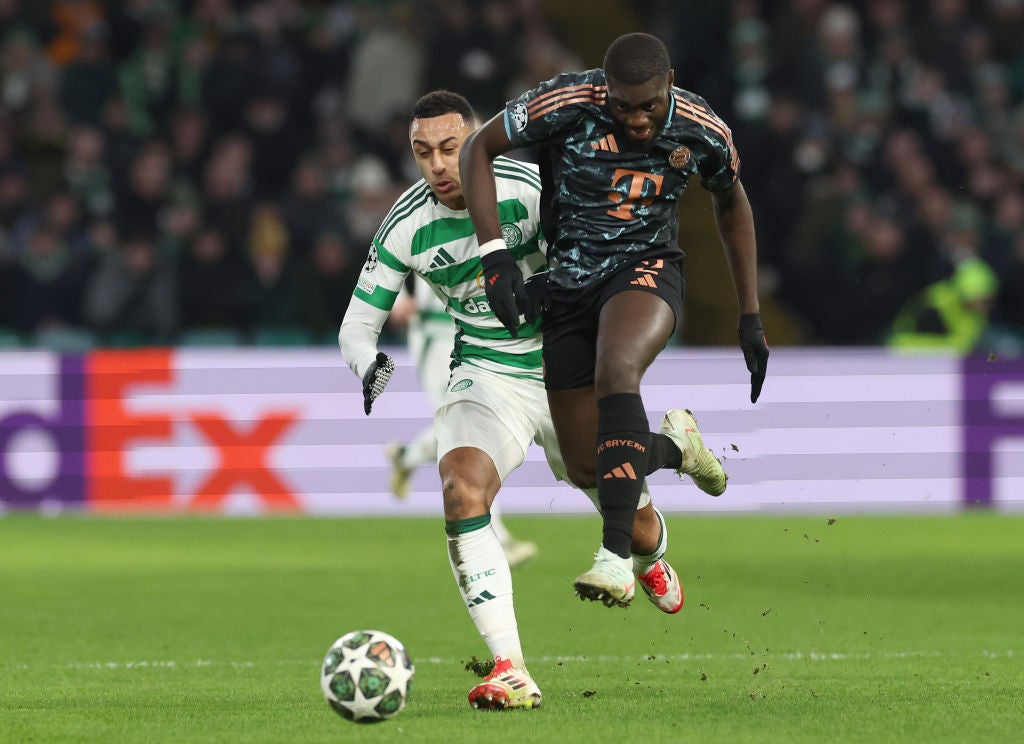
Declan Rice’s brilliance last week at the Emirates Stadium has allowed Arsenal to dream big. With Real Madrid on the ropes, Mikel Arteta’s team have one foot in the Champions League semi-finals. While caution is urged in the dressing room, it’s impossible to contain the euphoria outside.
Fans, pundits, and club legends are confident they can finish the job. “If Arsenal manage to beat Real Madrid, anything can happen,” Robert Pires, an ‘Invincible’ during his time in north London, says in an exclusive interview with the Independent.
The former Arsenal winger from the early 2000s sees this team as capable of winning the Champions League, although the road ahead is still long and complicated: “Knowing what it takes to win this title helps you do it again — and Arsenal don’t have that yet. In that sense, other clubs have an advantage, but nothing is impossible”.
Despite the commanding 3-0 in the first leg, no one dares to write off a Real Madrid side that is an expert in miraculous comebacks and magical nights at their intimidating Santiago Bernabéu. Nevertheless, if there’s a club that knows what it’s like to win there, this is Arsenal. Back in 2006, Thierry Henry led a historic victory in the Champions League round of 16.
“No one is invincible — not even Real Madrid. It’s a club that has something magical in this competition, a special love affair, which is why they’ve won it 15 times. But we showed 19 years ago that they can be beaten with hard work”, recalls Pires, speaking after playing at the EA7 World Legends Padel Tour in Paris.
That was the beginning of the end for the Real Madrid of the Galácticos era, remembered for its vast collection of stars like Zidane, Beckham or Ronaldo. “We weren’t afraid of them. The proof is how we played — with a lot of personality, winning 1-0. Of course it was difficult, but if you walk down the tunnel before the match with any kind of insecurity, Real Madrid will eat you alive. That Arsenal team was very strong — we truly believed we could knock them out”.
That is the best advice Pires gives to this new generation: to convince themselves that if they all work together, they will achieve it.
The threat, however, will be present from the first minute: “They don’t need to play well to win. Real Madrid have so much individual talent that at any moment, Mbappé, Vinicius, Rodrygo, or Bellingham can decide a match. That’s a real power”.
Ancelotti’s side will also have that almost mythical strength of the Bernabéu. “You always know you’re going to run and suffer — there’s no other way. It’s a stadium with incredible acoustics, the crowd is right on top of you, and the push it gives Real Madrid when they’re struggling is just immense”, he emphasizes.
Last time Arsenal played there, however, Henry silenced the stadium with an unforgettable play: “It was unthinkable that he would pull off a move like that. It was the kind of goal Messi would go on to score later. I remember watching him pick up the ball, with no teammates around, and just run straight at Casillas. I thought, “He’s crazy.” Sergio Ramos tried to block the shot but couldn’t get there in time. He was a beast”.
Pires watched that goal from the bench, as despite being an important player for Arsenal, Wenger opted for a different profile — one that was more hard-working and self-sacrificing.
“It was a tactical decision, mainly defensive. I contributed less than other players in that aspect, and Arsène was honest with me,” Pires recalls. “Of course, I wanted to play, but I didn’t get upset. The coach gave me his reasons, I accepted them, and I tried to help when I came on during the final stages of both legs”.
Arsenal’s run that season was flawless up until the final. After nearly a thousand minutes without conceding a single goal, they knocked out Real Madrid, Juventus, and a spirited Villarreal side.
“If Riquelme had scored that penalty in the semi-finals, Arsenal wouldn’t have reached the Champions League final,” a humble Pires admits. “I think Villarreal would have come back in the tie. We faced Real Madrid and Juventus, but the toughest opponent was Villarreal. They didn’t have the big name, no European tradition, but they had hunger, good players, and nothing to lose. They had eliminated Inter and facing Arsenal was a bonus for them. We suffered a lot at El Madrigal but… we finally reached our goal.”
A massive exodus of fans set off from London to Paris to witness one of the most relevant matches in the club’s history. However, the night of May 17, 2006, ended with Arsenal’s hopes of conquering Europe shattered.
“That defeat against Barcelona still hurts. It’s a wound that never fully heals. Reaching a Champions League final is incredibly difficult, but to come so close and not win it is hugely frustrating. It’s 2025 now, and that bitter memory still hasn’t faded”, admits Pires.
Losing was tough. The way it happened, even more so. In the 18th minute, a challenge by Jens Lehmann on Samuel Eto’o led to the Arsenal goalkeeper being sent off. Wenger, forced to bring on Manuel Almunia, sacrificed Pires.
“It killed me at that moment. I might be wrong, but I had a special connection with Henry and thought that at any moment we could have caused Barça problems. We would have preferred for the referee to allow [Ludovic] Giuly’s goal and keep eleven players on the pitch. I believe we would have won that final. Until that controversial moment, we were playing better than Barça”.
He now looks back on that moment with a certain fondness, but at the time, it was hard for him to come to terms with what had happened. “It took me two days to talk to Wenger. I needed to understand his decision. He admitted to me that it was the hardest and most painful one of his managerial career. But I forgave him. I spent six years at Arsenal, we won many things, and I prefer to remember the good moments”.
Source: independent.co.uk


